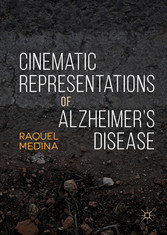Suche
Lesesoftware
Info / Kontakt
Cinematic Representations of Alzheimer's Disease
von: Raquel Medina
Palgrave Macmillan, 2018
ISBN: 9781137533715 , 231 Seiten
Format: PDF, Online Lesen
Kopierschutz: Wasserzeichen




Preis: 109,99 EUR
eBook anfordern 
Acknowledgements
6
Contents
8
List of Figures
9
Chapter 1 Introduction
11
Bibliography
22
Chapter 2 Old Age and Alzheimer’s Disease in Film
25
2.1 Old Age, Ageing, and Ageism
25
2.2 Mapping Dementia and Alzheimer’s Disease
29
2.3 The Medicalisation of Dementia
33
2.4 The Burden of Care and Personhood
35
2.5 Dementia Narratives
39
2.6 Alzheimer’s Disease in Film
43
Bibliography
46
Chapter 3 Intergenerational Interactions and Alzheimer’s Disease
54
3.1 Dependency Theory, Intergenerational Support, and Care
58
3.2 Family Interactions and Alzheimer’s Disease
60
3.3 Grandson’s Solidarity in Pandora’s Box
65
3.4 Father, Son, and Granddaughter in A Separation
72
3.5 Conflict and Loneliness in Poetry
77
3.6 Living in a Nursing Home: Identity Narratives and/or Narrative Identities
81
3.6.1 Cortex
82
3.6.2 Wrinkles
86
Bibliography
96
Chapter 4 Gender and Alzheimer’s Disease: The Power of Words, Herbs, Water, Veils, and Mountains
104
4.1 Solidarity Among Women and Ecofeminism: The Good Herbs
106
4.2 Old Cats and Matrophobia: Water and Motherhood
116
4.3 Poetry: Seeing, Feeling, Writing, and Water
119
4.4 Nation, Gender, and Loss
127
4.4.1 Pandora’s Box
128
4.4.2 A Separation: Gender and National Belonging
132
References
139
Chapter 5 Agency and Masculinity in Alzheimer’s Disease: Cortex (2008) and The Memory of a Killer (2003)
143
5.1 Heroes and Villains: Crime Film and Masculinity
144
5.2 The Male Star System and Ageing in the Film Industry
146
5.3 Cortex: When Sherlock Meets Alzheimer’s Disease
148
5.4 Cortex: The Detective-Hero’s Masculinity and the Femme Fatale
158
5.5 The Memory of a Killer: Alzheimer’s Disease as Moral Rehabilitation Therapy
162
5.6 Masculinity Versus Femininity: Childhood Versus Adulthood and Old Age in the Memory of a Killer
169
References
174
Chapter 6 Recovering the Past: Historical Memory and Alzheimer’s Disease
178
6.1 Spain and Documentary Film
180
6.1.1 A New Documentary Film and Postmemory
184
6.1.2 Swimming
188
6.1.3 Bucharest, the Lost Memory
193
6.2 Remember: Holocaust, Dementia, and the Politics of Revenge
197
Bibliography
208
Chapter 7 Conclusion
212
Bibliography
220
Index
222





